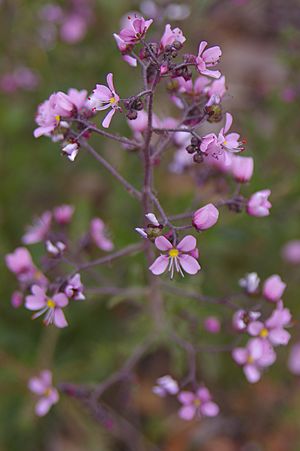Diplopeltis huegelii facts for kids
Quick facts for kids Diplopeltis huegelii |
|
|---|---|
 |
|
| Diplopeltis huegelii in Gooseberry Hill National Park |
|
| Scientific classification |
|
| Kingdom: | Plantae |
| Clade: | Tracheophytes |
| Clade: | Angiosperms |
| Clade: | Eudicots |
| Clade: | Rosids |
| Order: | Sapindales |
| Family: | Sapindaceae |
| Genus: | Diplopeltis |
| Species: |
D. huegelii
|
| Binomial name | |
| Diplopeltis huegelii Endl.
|
|
| Script error: The function "autoWithCaption" does not exist. | |
| Synonyms | |
|
|
Script error: No such module "Check for conflicting parameters".
Diplopeltis huegelii is a special kind of shrub. It belongs to a plant group called the Sapindaceae family, which is also known as the soapberry family. This plant is unique because it is endemic to Western Australia. This means it grows naturally only in Western Australia and nowhere else in the world!
What Does Diplopeltis huegelii Look Like?
These shrubs are usually quite small. They can grow to different heights, from just 0.1 meters (about 4 inches) up to 1.5 meters (about 5 feet) tall.
Diplopeltis huegelii produces beautiful flowers. These flowers can be white, pink, or even purple. You can see them blooming for a long time, typically from April all the way through December, in their natural home in Western Australia.
How Was This Plant Discovered and Named?
The first official description of Diplopeltis huegelii was written by an Austrian botanist named Stephen Endlicher. He described the plant in 1837.
The very first plant specimen used for this description was collected in Fremantle. It was found by a person named Charles von Hügel. This original plant sample is called the "type specimen." It helps scientists know exactly which plant the description refers to.
Are There Different Types of Diplopeltis huegelii?
Yes, scientists have found that there are three different kinds, or subspecies, of Diplopeltis huegelii. These are like slightly different versions of the same plant. They are:
- D. huegelii Endl. subsp. huegelii
- D. huegelii subsp. lehmannii (Miq.) Keighery
- D. huegelii subsp. subintegra (A.S.George) Keighery
 | Victor J. Glover |
 | Yvonne Cagle |
 | Jeanette Epps |
 | Bernard A. Harris Jr. |

